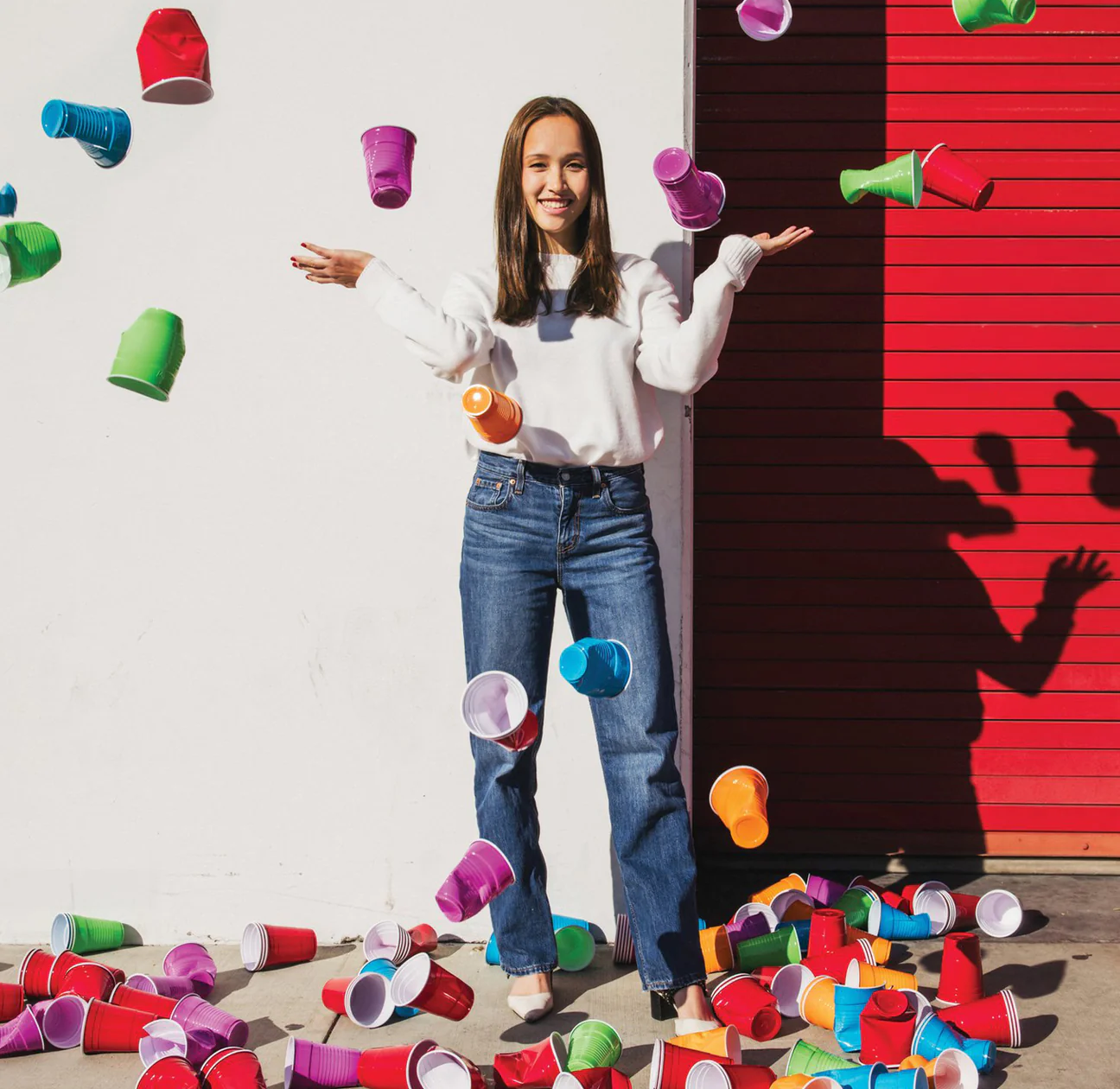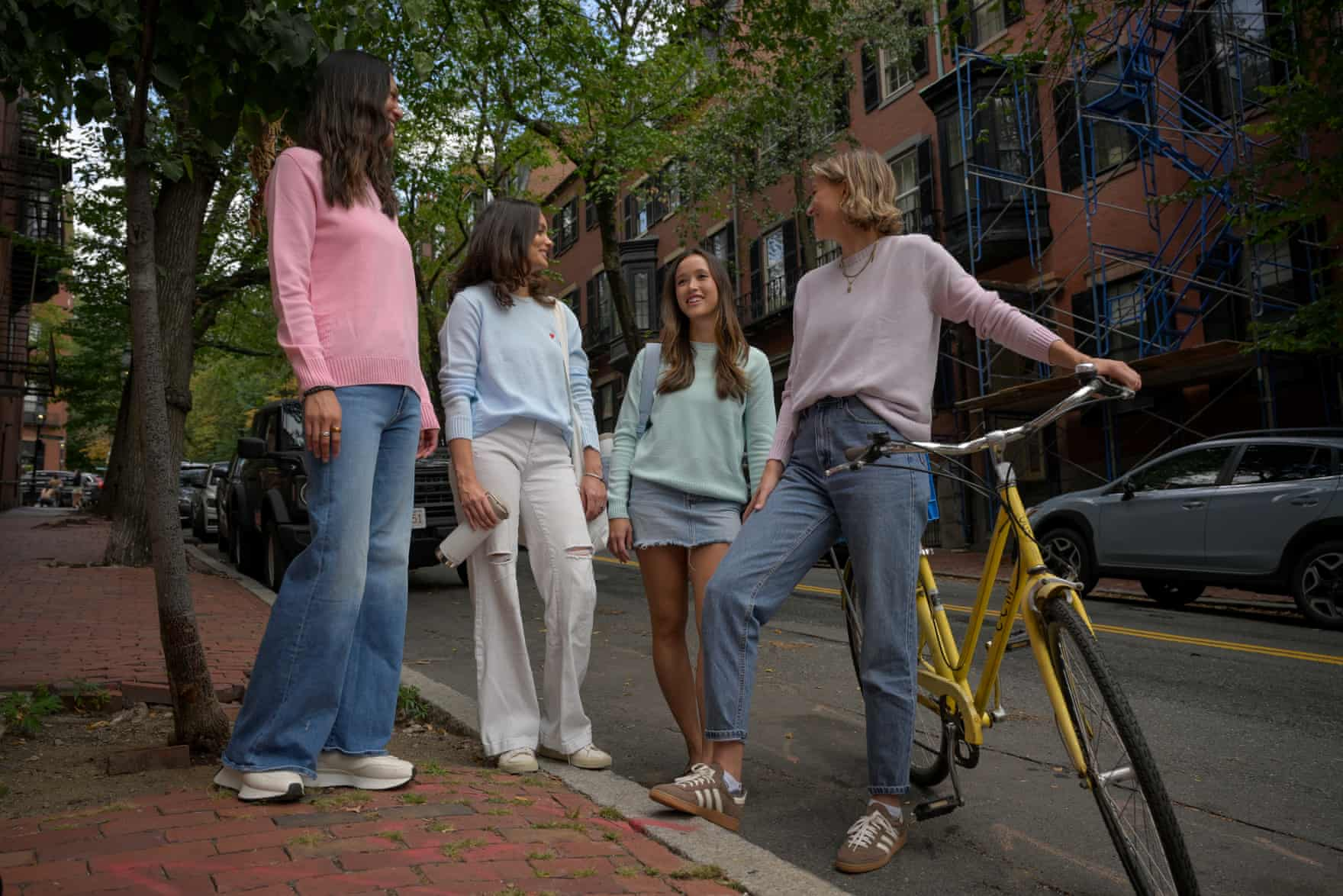Party cups are ubiquitous on US college campuses, coming in a rainbow of colors like red, blue, and pastel pink. Once seen as a health precaution during infectious disease outbreaks in the early 20th century, these single-use cups are now a major source of pollution, with over 7 billion discarded annually in the US.
Lauren Choi, a Johns Hopkins University alumna now studying at the Massachusetts Institute of Technology (MIT), saw an entrepreneurial opportunity in this "unwanted" waste and founded The New Norm, a sustainable textile startup.
 |
Lauren Choi, founder of The New Norm, amidst recycled materials. Photo: The New Norm |
Lauren Choi, founder of The New Norm, amidst recycled materials. Photo: The New Norm
Choi began developing a plastic-spinning machine in 2019, during her final year as a materials science student at Johns Hopkins. After successfully building the device in her family's garage, she partnered with student groups to collect thousands of red cups as raw material for her yarn experiments.
The textile industry is the second largest polluter globally, after plastics. Choi's creation of a sustainable fashion material from plastic addresses both issues. By using party cups, she eliminates the dyeing process, with the final product retaining the original color of the raw material.
Following these initial successes, Choi secured funding after graduating amidst the Covid-19 pandemic to focus on product development. However, scaling up production brought new challenges.
The first hurdle was sourcing raw materials. Choi worked with suppliers using recycled plastic from facilities nationwide. But many batches were contaminated or contained too many different materials to be usable. "Recycled materials are still a 'Wild West' market. We had to test many batches before finding the right suppliers," she said.
The next challenge was the yarn's texture. Despite being made from plastic, Choi wanted the final material to have a fabric-like quality. The initial recycled yarn felt too plasticky, lacking the softness of traditional textiles. Choi sought technical assistance from Gaston College's Textile Technology Center in North Carolina.
"Knitted material needs to be breathable and warm. It can't feel like you're wearing a plastic cup," said Jasmine Cox, executive director of the Gaston Center. They helped Choi develop a custom formula to soften the fabric.
 |
Lauren Choi (second from right) and friends in sweaters made from recycled party cups in Boston, Massachusetts, 13/9. Photo: The Guardian |
Lauren Choi (second from right) and friends in sweaters made from recycled party cups in Boston, Massachusetts, 13/9. Photo: The Guardian
Choi compares the process of creating yarn from plastic cups to baking. They needed to create a "recipe" to combine different recycled components for the perfect final product.
During development, The New Norm received funding from Choi's alma mater, Johns Hopkins, as well as Reynolds Consumer Products, the parent company of the Hefty party cup brand, among others. In 2023, they launched their first collection of sweaters and beanies made from 5,000 plastic cups, selling directly to consumers. Priced between 45 and 85 USD each, the products sold out within two months.
Some are skeptical about "wearing plastic." However, according to a 2024 report by Textile Exchange, 60% of materials used in fashion are derived from plastic, more commonly known as synthetic fibers or polyester. The global sustainable textile market was valued at 29.5 billion USD in 2024 and is projected to reach 71 billion USD in the next 7 years.
Technology is a key focus for Choi. Besides continuously improving the spinning machine, she collaborates with partners to produce 3D-printed, seamless sweaters and beanies. This eliminates the yarn waste typical of traditional methods.
The company now uses various plastics, but colorful party cups remain a significant source. Cox sees this as a unique approach. On one hand, these cups, along with food containers and packaging, are discarded in large quantities daily, with limited recycling solutions. On the other hand, using party cups gives the final product its natural color, eliminating the water- and chemical-intensive dyeing process.
The startup maintains a lean operation. Choi moved to Boston to pursue an MBA at MIT. She says the company has between 3 and 25 employees, depending on workload. She declined to share sales figures but noted that production has increased from tens to thousands of pounds in the past two years.
They plan to partner with major brands to develop sustainable materials at scale. The New Norm is currently testing the durability of its yarn after washing.
Choi hopes The New Norm can contribute to mitigating the global plastic crisis, with the world now producing 200 times more plastic than in 1950. An estimated 8 billion tons of plastic waste has leaked into the environment globally. The health costs and lost productivity from illnesses caused by just three plastic chemicals alone have reached 1.5 trillion USD.
Bao Bao (The Guardian, The New Norm)












